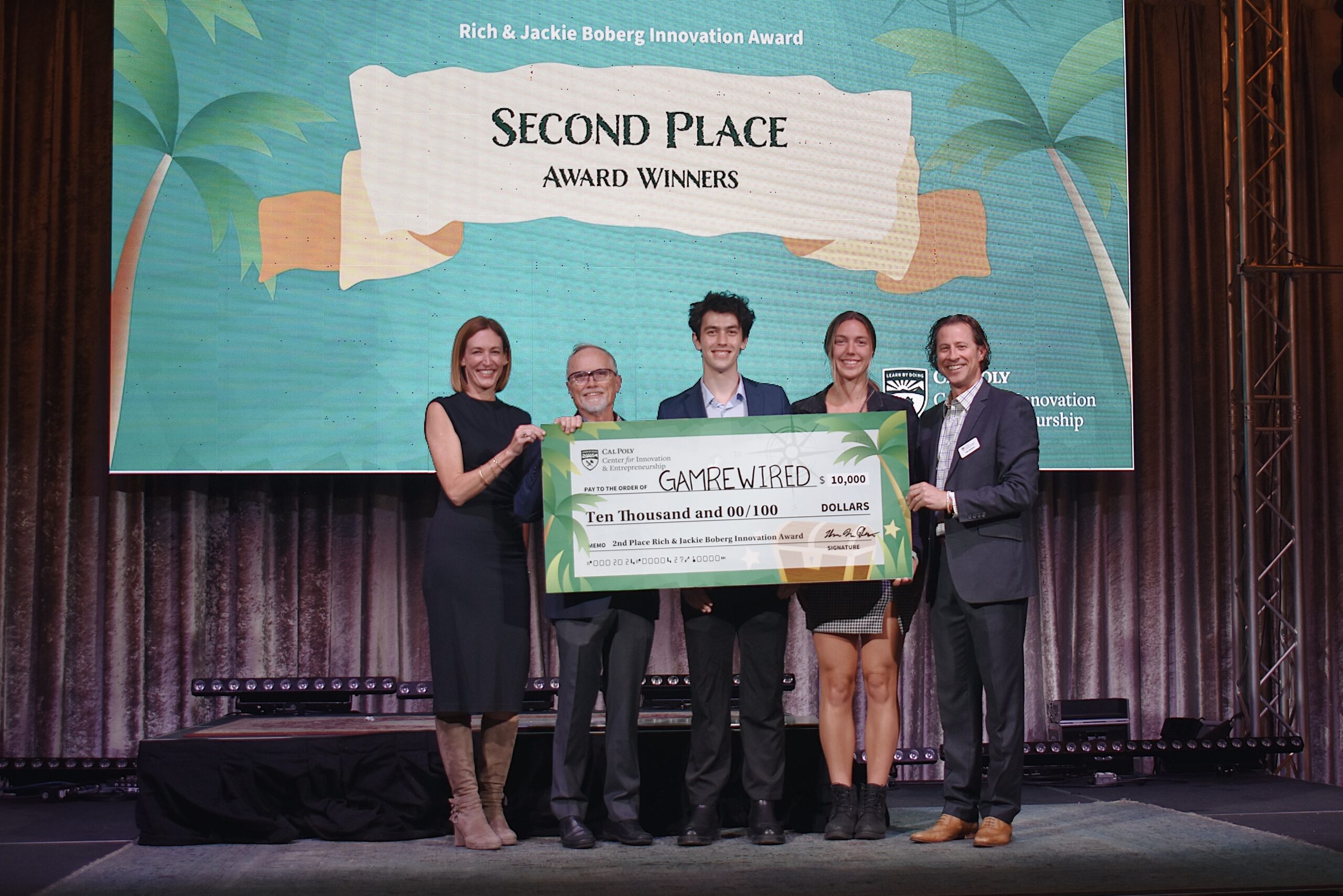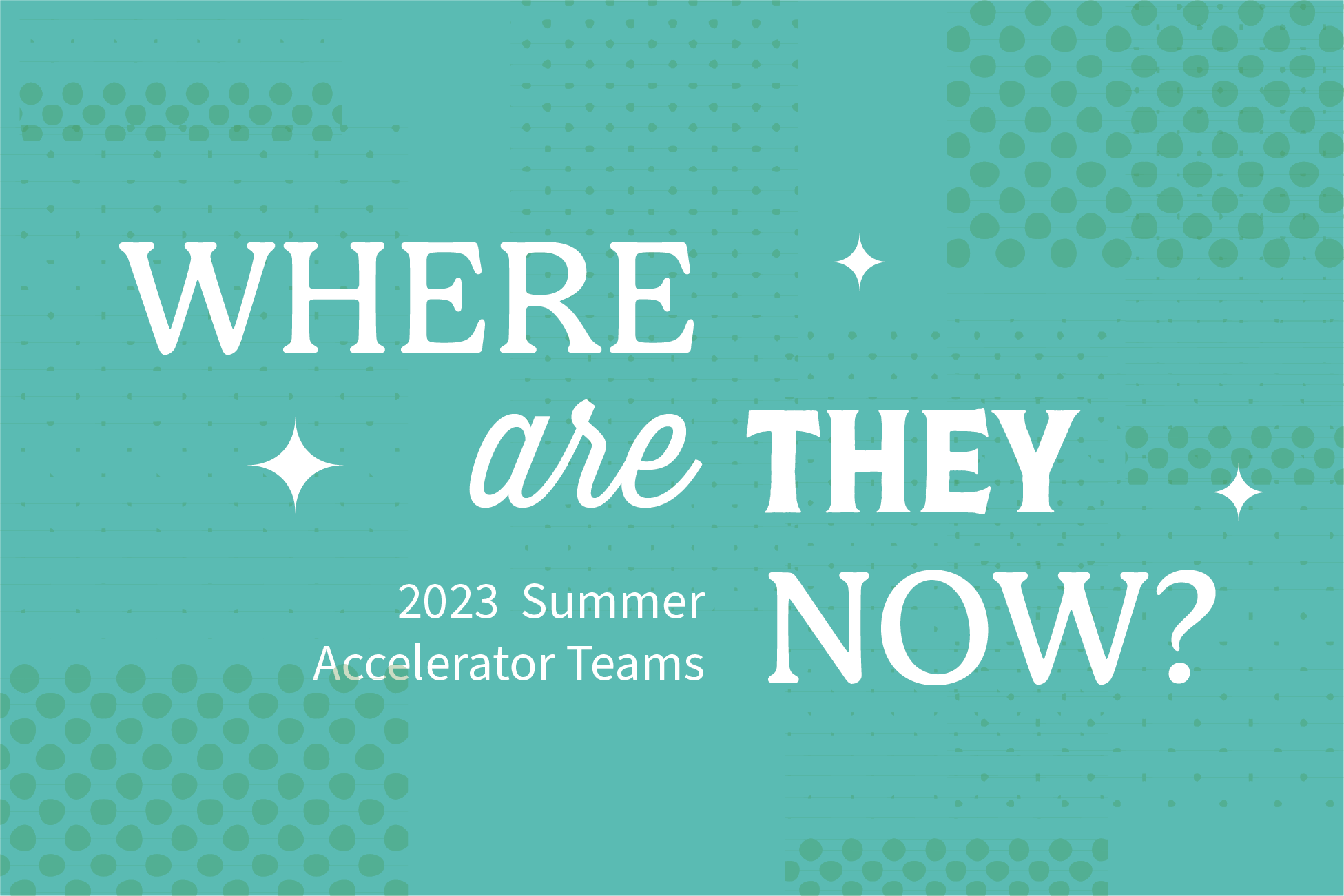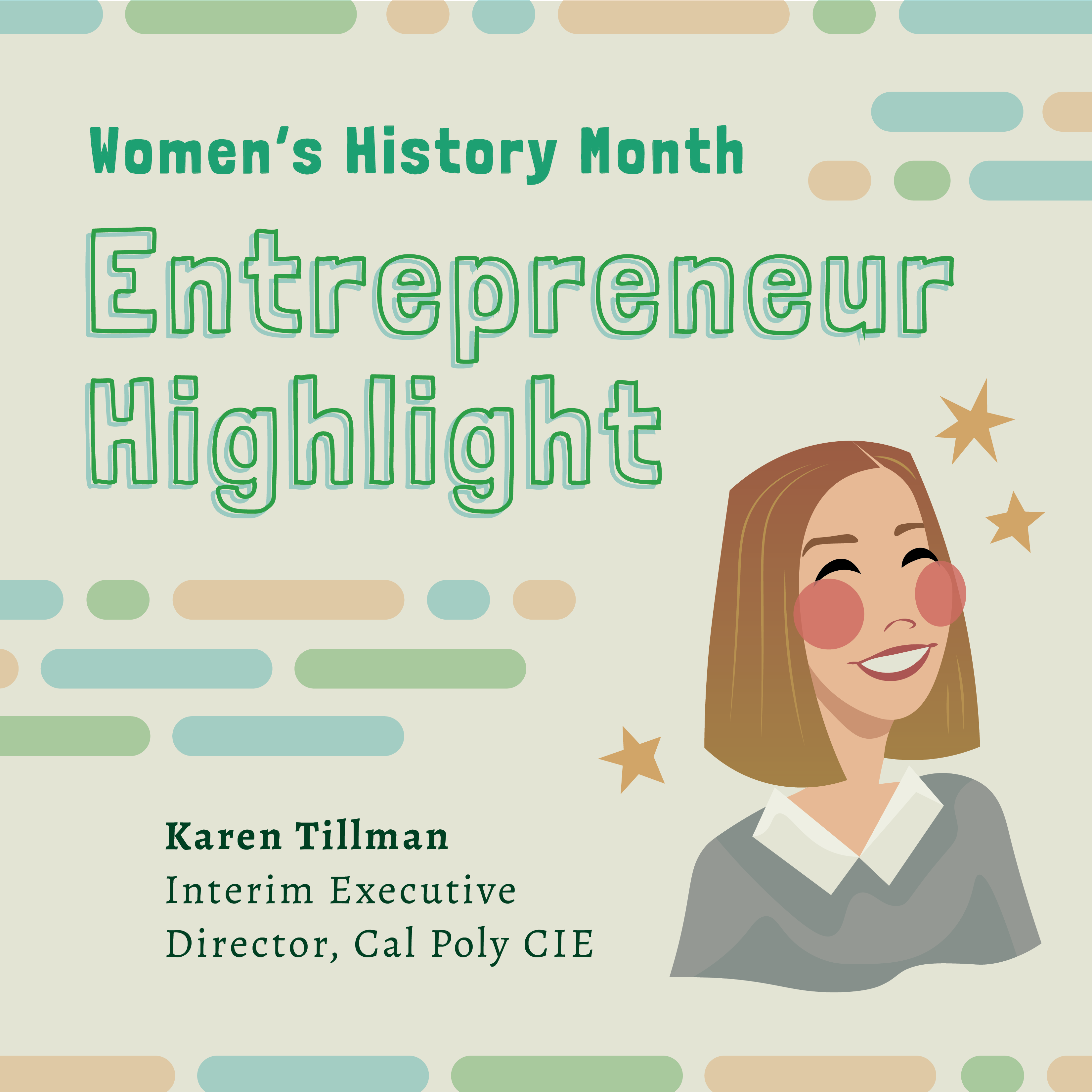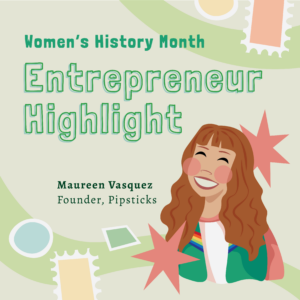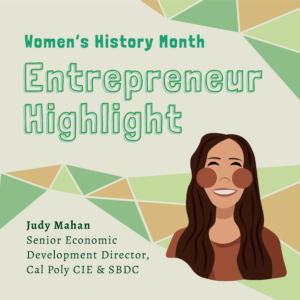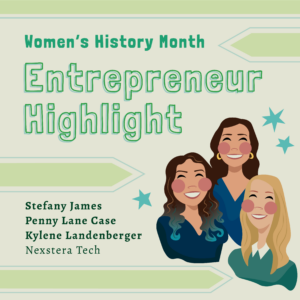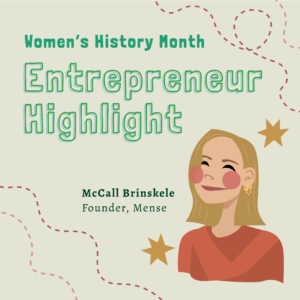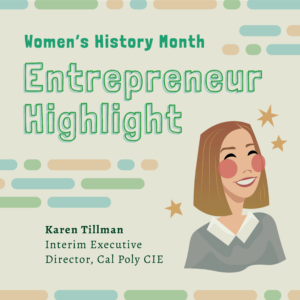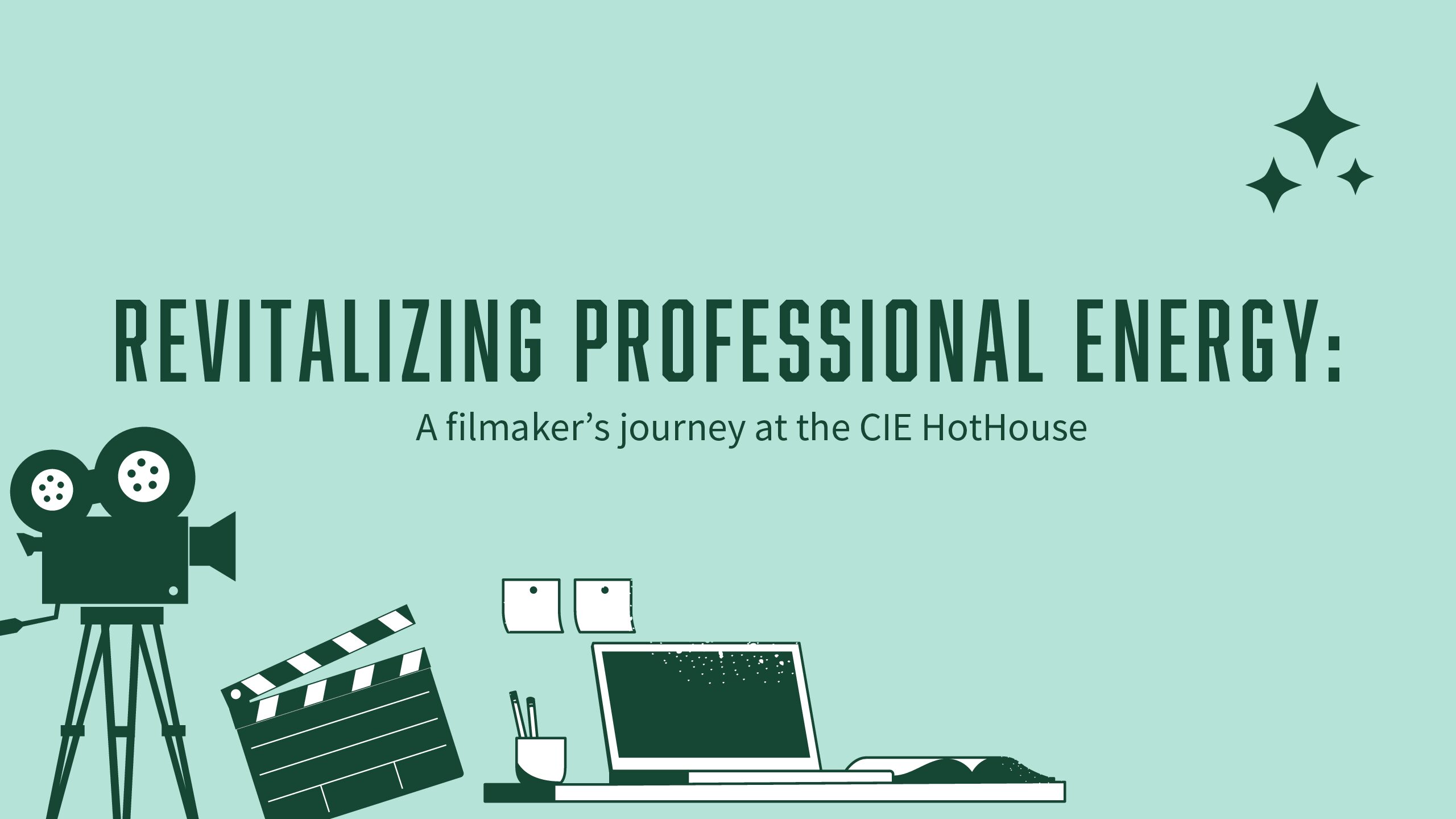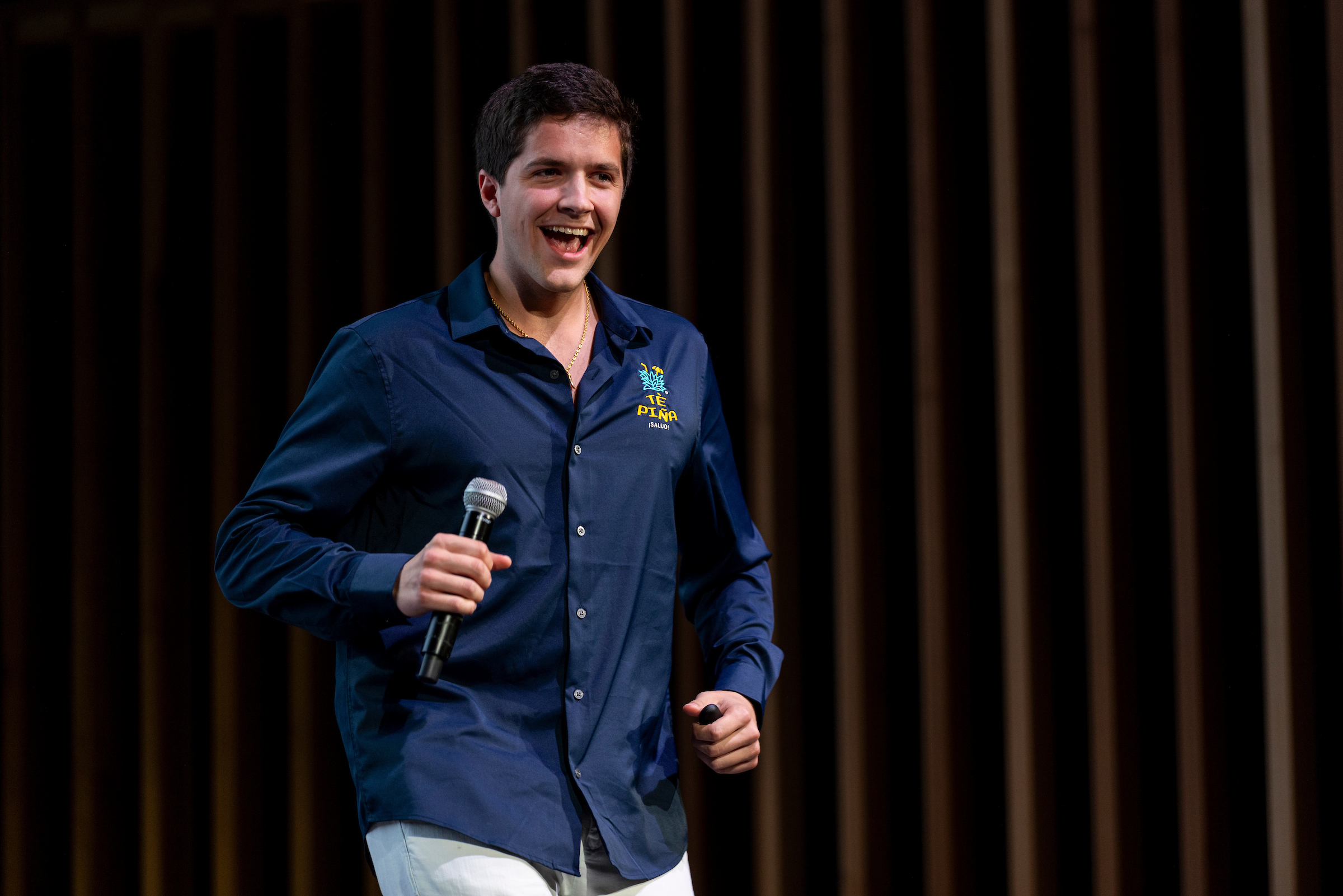It’s been more than six months since the 2023 Cal Poly Center for Innovation and Entrepreneurship (CIE) Summer Accelerator came to an end. During the Accelerator, Cal Poly students and recent graduates spent 12 weeks immersed in the startup process, turning their startup ideas into real, viable businesses.
The program culminated at Demo Day, where the participating teams showcased the progress they made on their startups throughout the summer and pitched their companies.
Since Demo Day, the 2023 Summer Accelerator cohort has embarked on new professional, educational and entrepreneurial endeavors.
Here’s a team-by-team breakdown of what the cohort has been up to:
Ecoternatives | ENTEIN | Horizen Technologies | Mí Tiara | Nexstera Tech | Social Spark | TensorMaker | Té Piña
Ecoternatives
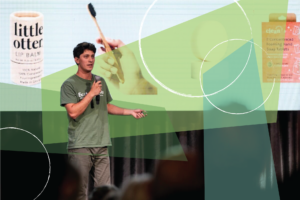
Aiden Riehl, founder and CEO of Ecoternatives.
Aiden Riehl, founder and CEO of Ecoternatives, joined the Summer Accelerator after working on his company from his room for the previous two-and-a-half years.
“The Accelerator was the first time where I met other people my age doing the same thing as me and where I felt normal in terms of entrepreneurial desires,” Riehl explained. “Although it lasted a summer, I think it impacts you for the rest of your life.”
Ecoternatives is an online marketplace that sells sustainable and plastic-free products at more affordable prices.
Since the Summer Accelerator, Riehl traveled for five months spanning from Indonesia, Southeast Asia, Australia and New Zealand.
Reflecting on his pre-Accelerator state, Riehl acknowledged feeling disorganized without procedures in place to improve his operations. During the Accelerator, he learned how to create these.
“With the help of the Accelerator, I was able to streamline a lot of the tedious tasks by building systems into my company,” Riehl said.
Amidst Riehl’s travels, he remained dedicated to advancing Ecoternatives. He introduced new processes for future employers, collaborated with content creators to bolster Ecoternatives and built out a marketing strategy.
Riehl finally completed one of his biggest goals: automating tasks onto people he trusts, he said. With his new operations, he could finally hire two employees who in turn allowed for Riehl’s travel.
In response to high customer demand, Riehl’s team is working on an Ecoternatives app for iPhones. Furthermore, Ecoternatives is creating a Build-a-Box subscription feature enabling customers to curate product bundles on a subscription basis.
Lastly, Ecoternatives expanded to 15 more eco-friendly products.
“With the Accelerator, I started thinking about my business long-term,” Riehl said. “ It made Ecoternatives into a real company with normal business practices and something I wouldn’t be embarrassed talking to investors and professionals about.”
ENTEIN
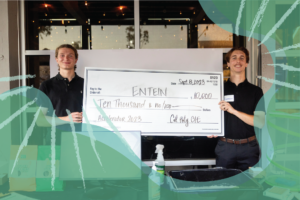
William Burns, founder of ENTEIN, and Cameron Yartz, former co-founder of ENTEIN (from left to right).
William Burns, a mechanical engineering major, began his CIE journey when he pitched his startup ENTEIN at Innovation Quest (iQ) 2023 and won the Environmental Impact Award.
ENTEIN is utilizing food waste to grow insects as an affordable animal feed protein supplement.
Feeling motivated by his success at iQ and eager to lift his startup off the ground, Burns joined the Summer Accelerator. For the summer, Cameron Yartz, a mechanical engineering major, also joined the project.
“The Summer Accelerator allowed us to move forward in ways we would not have been able to alone,” Burns said.
With the help of the Summer Accelerator, ENTEIN was able to monetize different aspects of their business, increasing investor interest, Burns explained.
Burns attributed much of their success to the networking opportunities over the summer.
“The connections I made through the Summer Accelerator were priceless. I could not have started a company if I didn’t have our lead mentor and the CIE staff helping with different aspects of Entein,” Burns said. “The people made it happen.”
Thinking back to Burns’ first pitch versus pitch at Demo Day, he said he grew a lot. The Summer Accelerator helped him better communicate about ENTEIN and relate their startup to various types of audience members, especially those not familiar with agriculture, he said.
Since completing the Accelerator, Yartz is now working on a different project with an interdisciplinary team to create a Prosthetic Aid for Lifting (PAL) so Madeline Everson, born with ulna and radius in her left hand, can continue lifting in the gym.
“This project is definitely out of our comfort zone, but we are motivated to succeed,” Yartz said.
Burns has continued to put full effort into ENTEIN while a full-time student. He is running testing on their product from multiple waste sources and has expanded in their greenhouse.
ENTEIN also doubled in growth capacity and is sending more samples to third-party suppliers to build production in the Sacramento and Fresno areas.
“I wouldn’t be where I am today if I didn’t have a full summer to follow my passion and work on ENTEIN,” Burns explained. “The Accelerator prepared me to run my business and gave me the tools and confidence I now use every single day.”
Horizen Technologies
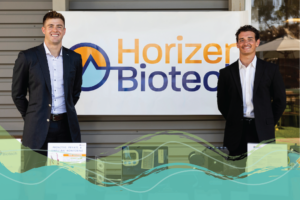
Owen Work and Camden Ford, co-founders of Horizen Technologies (from left to right).
Owen Works and Camden Ford, co-founders of Horizen Technologies (formerly known as Horizen Biotech and DrinkWise), went into the Summer Accelerator viewing their startup as a college assignment. However, during the summer, their perspective underwent a significant shift.
“Throughout the Summer Accelerator, Horizen Technologies changed from being an academic project into becoming a real business,” Ford said.
Horizen Technologies aims to create a drinking culture that prioritizes safety, health and well-being through their biosensor platform which monitors Blood Alcohol Content (BAC) levels.
Ford, a biomedical engineering graduate, initially hesitated to ask questions because of his limited entrepreneurial knowledge, he explained. However, he soon realized that everyone in the Accelerator was learning and he gradually became comfortable asking questions, failing, and ultimately gaining more, he said.
Following the Summer Accelerator, Horizen Technologies joined the CIE Incubator program. The Incubator is a two-year program providing early-stage companies the resources to develop into financially stable and high-growth companies.
“Getting into the Incubator was a huge accomplishment,” Ford said. “It’s guiding us in the right direction of how to operate, helping us raise funds and explore the customer we want while giving us a place to headquarter at.”
Since last summer, Works has been working on the company full-time while Ford is finishing his Master’s of Science (MS) in Biomedical Engineering at Cal Poly, dedicating his capstone project towards their product development.
Both have led various undergraduate student teams within the Orfalea College of Business and College of Engineering.
Recently, Horizen Technologies qualified as one of the top six finalists for AngelCon, an event where six qualified tech startups pitch their business for a chance to win $100,000+ in equity funding.
As the co-founders prepare for AngelCon, they have been seeking fundraising options and have completed several grant programs.
Horizen Technologies was chosen for the VentureWell Spring 2024 E-Team program. Out of the twenty-five teams, they advanced with seven others to the second stage where they received a $20,000 grant to build their business further.
The co-founders are grateful to the Accelerator for providing them with resources and connections who help mentor and teach them how to run their business, they said.
“We are relatively young and we’ve never started a business before, so we rely on knowledge from mentors who have done this before,” Ford said. “The Accelerator gave us great connections with people who want to help us and has made us not afraid to do what it takes to accomplish our goals.”
Buy your ticket for AngelCon and support Horizen Technologies on Thursday, May 2nd at 5:00 p.m. at Rod and Hammer Rock: https://angelcon2024.eventbrite.com/?aff=CIEwebsite
Mí Tiara
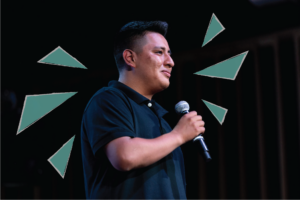
Luis Guzman, co-founder of Mí Tíara.
Computer science senior Luiz Guzman remembered the challenge of pitching his startup due to his “significant stage fright and public speaking issues,” he said.
However, after advice from mentors, he realized how important it is to pitch his startup or else it would simply not exist. This mindset helped him push through his nerves and eventually, during Demo Day, Guzman found the experience “exhilarating.”
Guzman and computer science senior Maricela Carillo co-founded Mí Tiara (formerly known as PlanForMí), a startup that leverages artificial intelligence (AI) to simplify the event-planning process by easily connecting local vendors and customers.
Looking back on Demo Day, Guzman felt a significant achievement and immense satisfaction from completing the program, he said.
“Representing my Hispanic community and showcasing diversity in the program added to my sense of pride and accomplishment,” Guzman explained. “It reinforced the importance of diverse perspectives in entrepreneurial endeavors and highlighted the value of inclusion and representation in the startup ecosystem.”
Following the Accelerator, Guzman and Carillo focused on the Accelerator’s feedback to refine their platform. This included enhancing their product features, expanding their vendor network and deepening their engagement with the Hispanic community, Guzman said.
Looking forward, Mí Tiara plans for a successful launch in Fresno County and plans on expanding into other regions with significant Hispanic populations.
As the co-founders continue running Mí Tiara, they credit the Accelerator for deeply ingraining the principles necessary to run a successful business, Guzman explained.
“The Summer Accelerator was a catalyst for growth, pushing me out of my comfort zone and enabling me to lead with confidence,” Guzman said. “The experience of pitching, networking, and strategizing under the Accelerator’s guidance was invaluable, laying a solid foundation for Mi Tiara’s journey beyond the program.”
Nexstera Tech
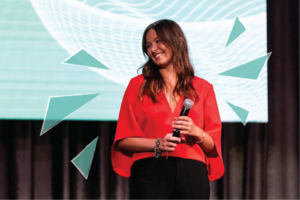
Penny Lane Case, co-founder and CEO of Nexstera Tech.
Penny Lane Case, co-founder and CEO of Nexstera Tech, remembers her excitement when pitching her startup on Demo Day. She felt pre-pitch nerves but was also confident in what her team accomplished over the summer, she said.
Nexstera Tech is pushing the boundaries of material differentiation and detection through AI-enhanced radar technology and transforming waste management operations. Their initial focus is identifying lithium-ion batteries in curbside buns before collection, aiming to mitigate the billion-dollar risk of battery-induced fires in the waste stream.
Case reflected on her experience: “My confidence, my technical knowledge and the way I was able to compose my thoughts definitely changed throughout the Accelerator and that translated to my more powerful presence on stage,” she said.
Case and her co-founders Stefany James and Kylene Landenberger have accomplished some big milestones since the Accelerator.
Nexstera Tech expanded its data collection operation by renting out a space to house their two labs and hiring three testing technicians. At these labs, they are collecting thousands of scans every week and sometimes over one thousand in one day, Case explained.
Furthermore, Nexstera Tech retrofit their first prototype on a Waste Connections Recycling vehicle at their San Luis Obispo Facility in December of 2023. They placed it on the oldest truck with the most challenging route to ensure their hardware could withstand the harshest conditions.
Alongside installing their product, Nexstera Tech joined the CIE Incubator and recently qualified as an AngelCon finalist with five other companies.
AngelCon is an event where six qualified tech startups pitch their business for a chance to win $100,000+ in equity funding.
“Getting into AngelCon was very reassuring.” Case said. “I love talking about what we do because I have immense confidence in our team and solution coupled with a deep passion for addressing this problem.”
Case attributes much of her success in learning how to run her company to the support from her advisors and the Summer Accelerator experience, she explained.
“The Accelerator truly made it possible for us to launch our company. It’s an incredible program full of resources, including valuable workshops and mentorship opportunities, that accelerate personal, business, and technical growth. I am forever grateful for the opportunity I was given as a member of the 2023 cohort.” Case said.
Buy your ticket for AngelCon and support Nexstera Tech on Thursday, May 2nd at 5:00 p.m. at Rod and Hammer Rock: https://angelcon2024.eventbrite.com/?aff=CIEwebsite
Social Spark
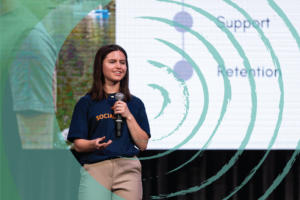
Samantha Moberly, founder and CEO of Social Spark.
Samantha Moberly, the founder and CEO of Social Spark, expressed gratitude towards the Summer Accelerator for its role in nurturing her startup. She credited the program for transforming her startup from a class project into the beginning of a real business, she said.
Social Spark is a social networking platform aimed to combat loneliness by helping recent graduates and early-in-career individuals create new friendships through in-person events and outings.
“We started out thinking we already had the start of a business. But, the more we talked to advisors and learned the different components needed for a business, the more we were able to really build a foundation for something that could actually turn into a real company,” Moberly said.
During the Accelerator, Moberly realized how important it is to work around people when taking on big endeavors like building a startup. One of her favorite parts of the program was working with mentors — who she still frequently speaks to — and other startups to help build ideas, she explained.
“When you get to spend the whole summer talking to amazing people who have created fantastic businesses and they engage with you like a peer, it really grows your confidence knowing you can actually speak with people like that,” Moberly said.
After Demo Day, Moberly felt more solidified in Social Spark and confident to answer any questions presented to her.
Since the accelerator, Social Spark hosted more successful events in the Bay Area, trying out different kinds including single-evening events, single-day events, and day-and-a-half events. She also developed a Social Spark membership where their algorithm matches members based on similarities, forming smaller groups for casual outings.
Social Spark has been receiving positive customer reviews and customers who return to multiple events.
Moberly appreciated the Summer Accelerator for providing her tools to operate Social Spark.
“It took some adjustment ending the Summer Accelerator and no longer having a structured environment every day with check-ins each week. But that’s the important part of the process — moving forward and having the tools to run your startup without as much guidance,” she said.
“I wouldn’t be where I am today if I didn’t have a full summer to follow my passion and work on ENTEIN,” Burns explained. “The Accelerator prepared me to run my business and gave me the tools and confidence I now use every single day.”
TensorMaker
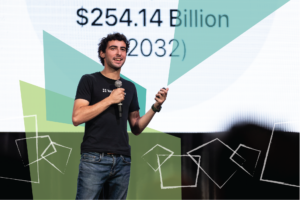
Avi Peltz, former founder of TensorMaker.
Following the Summer Accelerator, Avi Peltz, former founder of TensorMaker, moved to the San Francisco Bay.
TensorMaker was a platform that made building machine learning applications fast, easy and accessible to everyday developers.
Since living in San Francisco, Peltz reconnected with co-founder of BioGlyph and first-place winner of Innovation Quest 2023, McClain Kressman. Avi Peltz is now working full-time as CTO at BioGlyph.
BioGlyph streamlines the process of biologic, or medicine, development and iteration — as well as user modification tools — allowing researchers to easily shift between visual, markup and serial representations of medications developed from living organisms.
Té Piña
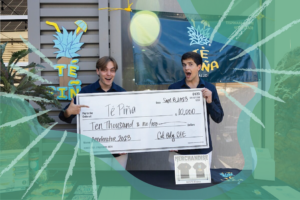
Benjamin Arts and Matt Reis, co-founders of Té Piña (from left to right).
Business administration seniors Mathew Reis and Benjamin Arts were excited to join the 2023 Summer Accelerator to leverage its resources and grow their startup Té Piña, a pineapple-based beverage that provides consumers with a healthier alternative to energy drinks.
“During the Summer Accelerator, you’re able to get mentorship, money, support and connections to really accelerate your business,” Arts said. “You grind out the work and can see your business progress every single day,” Arts said.
Arts and Reis attributed both their company growth and business understanding to the mentorship they received during the program.
“I went into my last quarter of school after the Summer Accelerator with more proficiency and efficiency in my classes,” Reis said. “I was able to be more responsible and business-oriented.”
Following the Summer Accelerator, Arts and Reis have continued their work on Té Piña while delving deeper into the startup world.
Since January, Reis has been working for Quickie Delivery Co, a startup delivering convenience store essentials to college students quickly, affordably and sustainably.
“Because of the mentorship and expertise I gained in the Accelerator, Quickie Delivery Co, a past Summer Accelerator team, saw my potential and decided to bring me on to run their finances and do their books,” Reis explained.
Similarly to Reis, Arts also became involved in another startup. He co-founded Mr. Turtle Laundry, a refillable laundry detergent machine placed in grocery stores and laundromats.
With Mr. Turtle Laundry, he won first place at the Cal Poly Entrepreneurs Startup Marathon, a 54-hour-long event where innovators create interdisciplinary teams and develop a business over the weekend.
“Without my experience around Té Piña, I would have been lost in this project,” Arts said.
For Té Piña’s future plans, the co-founders intend to make the most of their current resources, putting aside further developments until they have the necessary funds.
Reis and Arts believe Té Piña is a promising venture, enjoy running the company, and are eager to dedicate more time on it in the future, they said.
